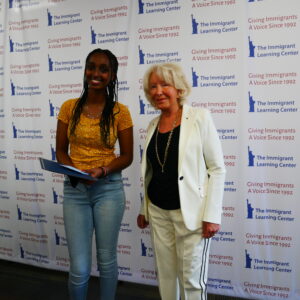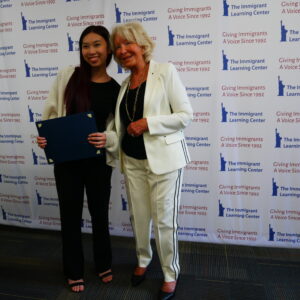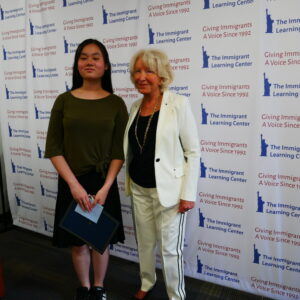The annual Teen Perspectives Contest from The Immigrant Learning Center highlights the voices of the latest generation of American high school students. Immigration is a topic outside of their control that also very much affects their lives, and we think these students have something to teach us if we give them a chance.
In 2024, students at Everett, Malden and Medford high schools submitted essays, videos and works of art expressing their perspectives on the theme “What immigration means to me.” Scroll down to see winning submissions from 2024 and prior years, and click on the image of the 2024 magazine to see all of this year’s submissions.
2024 First Prize Essay
The Nose Ring on My Lip, by Simran Tamang, 12th grade
Nose rings are cultural in Nepal. Girls get the left side of their nose pierced as a sign of femininity–a nod to their elegance. Grandma got her nose pierced just five days after her birth, and Mom at age three. Amongst my family, I was a late bloomer at age nine.
Months prior to my piercing, I rambled endlessly about the perfect color, the perfect gem, my friends and classmates victims to my excitement. When the needle finally pricked my skin, the promise of a Kinder Joy chocolate alleviated any pain. At that moment, I was eager to participate in my culture–to be patriotic, a characteristic I longed to protect.
One month, two plane rides, and countless painstaking goodbyes later, the high from the glory diminished. Before I knew it I was standing in front of unknown juvenile faces, introducing myself. In this crowd of 4th graders, I saw no one who looked like me. No red tikka on their foreheads, no necklaces with Ganesh the God. And no shiny nose rings.
“My name is Simran, and I am from Nepal,” I choked out with a shaken voice. Did their features contort into nasty visages as a reaction to my strange accent, or to the shiny gem placed on my nose?
While only 6mm long, the ring had clawed its way to my lips, piercing it shut. I couldn’t release another word in class for the rest of middle school. I wanted to rip my nose ring off.
At home however, I was free to be outspoken. I was an accountant, honored with the task of translating tax papers. Adjusted Gross Income. Capital Gains. Cost Basis. I fought to translate each word precisely as does a tenured employee.
“Ohhh, I get it,” My father said. The next day, he and I met a tax advisor over Skype, and my translation services were on full display
While dreaded by most people, I anticipate tax season. It’s a time when I embrace my identity as a Nepali, and I cherish the duty to advocate for my family. I let my tongue flow back to its native intonation, easily switching to a well rehearsed accent when necessary.
Numerous chats with advisors and experts later, my voice isn’t confined merely to Skype calls, but ascends in increments, steadily flowing out of my larynx past the doors of our home to the councilors of City Hall and to members of my school community. Rather than retaining the pitch of my mother tongue or the cadence of this acquired dialect, my every articulation
commands attention: be it towards justice and representation for youth in my city or helping immigrant families build foundations for their future.
At the annual Nepali function held every June, a middle-aged woman recognized me from her frequent visits to community and school events.
“You kids are amazing,” she exclaimed.
I had helped translate Nepali to her at Parent-Teacher Conference nights. Being able to converse with her daughter’s teacher allowed her to finally understand the best ways to help her daughter succeed in school.
I came to understand then that I am helping immigrant families navigate the dangerous cycle of naivety that constrains them from thriving in their strange surroundings. These appreciative smiles directed to me, and thank you messages sent over social media motivate me to sustain my efforts.
The flow of my vocal resonance slowly maneuvers my nose ring out of my lips and back to its former residence. No longer are my lips sealed by the ornament decorating my face. More so, I am delighted to uphold a piece of my culture in educational settings and beyond it. I am a presence who transcends beyond the nose ring that once governed my life. I am an advocate for my community, a skilled accountant, and just a girl with a nose ring.
And proud of it
2024 First Prize Artwork:
Nuevas Esperanzas/New Hopes, by Gabriela Paniagua Castro, 12th grade

2024 Videos
Remaining 2024 Finalists
Second Place Essay: Kathleen Yick
Third Place Essay: Anonymous
Honorable Mention Essay:
- Gabriel Ponce Lemus
- Daniela Licona-Cruz
- Lily Nguyen
- Shelina Nguyen
- Raphael Orcino
- Tsering Shakya
- Jelani Tah
- Hadjar Yousfi
Second Place Artwork: Miaoyi Hu
Third Place Artwork: Hadjar Yousfi
Honorable Mention Artwork:
- Nery Castaneda
- Magdelawit Takele Magdelawit
- Lily Nguyen
- Angela Phu
- Nicolas Polanco
- Aquiles Puissing
Thank you to Teen Perspectives 2024 sponsors
Christopher Cinella, Financial Advisor
![]()
Diane Portnoy, The ILC Founder and CEO
Carmel Salhi, Northeastern University
Thank you to our judges
Visual Art
- Bitho Faustin, artist
- Ed Rocha, Rola Education
- Pam Shanley, Arts Collaborative Medford
- Anna Thai, Anna Thai Embroidery
- Kevin Thai, Three Circles Studio
Essay
- Mark Puleo, Brazilian Magazine
- Carmel Salhi, Northeastern University
- Jodie Zalk, Malden Reads
Video
- Seth Bender, videographer
- Anne D’Urso-Rose, Urban Media Arts
2023 First Prize Essay: Breaking Social Divisions and Inspiring Togetherness, by Makeila Scott, 11th grade
“I was 19 when I left Panama,” my Dad says, “I left behind everything in hopes of finding something here, a better life, better opportunities,” he continues in his thick Panamanian accent that never fails to remind me of the rich history and ancestry that courses through my veins. ”I was surprised to see the snow for the first time…It was really cold over here, I almost thought of going back,” he chuckles. As I sit on the couch bombarding my dad with questions that surely he is proud to answer, I stare in awe at the stories he has to share. These stories are not confined to the four walls of my house but are found all around my community as a whole: Malden.
If you picked two students, at random, from Malden High School, there would be a 76% percent chance they’d be of different race (Ciurczak); this is not evident through solely a statistic but is evident by simply looking around. The halls of Malden High and Malden in its entirety are painted in an array of backgrounds, languages, and customs that fuel our community and enrich its soil. Through the restaurants that line the square – Babas supermarket, Gongcha, Crying Thaiger – to the programs and organizations that work to uplift the immigrant and bipoc voice: AVOYCE, The Immigrant Learning Center, Chinese Culture Connection. All these businesses work in tandem to deliver a unique gift to Malden that many other communities simply cannot: Unity. At a time where our society is so heavily divided in terms of politics, race, and gender all sense of unity and collaboration is a gift that should be valued (Bremmer). It’s easy to remain complacent with the status-quo but takes active effort to elicit change; Malden is a community that strives to achieve the latter.
When sitting in class and having discussions about important topics whether they are about historical events or debates about current world affairs, it’s important to hear opinions that come from different perspectives instead of confining ourselves to a bubble of like minded individuals where all creativity and challenges of thought are lost (Burbidge). Society will not progress if ideas are not being challenged. The social divisions that are prominent in society will remain as such if we cannot learn to listen rather than attack. Though, this is the beauty of Malden; Immigrants and people of all nationalities are able to converse and work with one another to break those aforementioned social divisions.
Malden is a community that fosters, from a young age, the importance of togetherness. Malden is a community raising a generation of open minded individuals that are not afraid to learn nor afraid to ask questions. Malden is a community fostering future leaders and empowering each person to utilize their voice and utilize their story. Malden encourages this as I sit here writing this essay utilizing my own voice to bring light to the gifts Malden has to offer.
The breaking of these social divisions does not have to be done solely through some big protest or large movement but can be attained through smaller everyday experiences such as learning other languages or trying new foods. In my Trig and Pre-Calc class I sit next to a student who recently moved from China. I had lost my glasses and one day I asked him “how do you say ‘I can’t see’ in mandarin?” simply out of pure curiosity “Wǒ kàn bùjiàn” he answered. “Wǒ kàn bùjiàn” I replied, certainly not as well though. Even so, I was proud to have learned something new, something that I may not have been able to learn if I lived elsewhere. Every class after that we’d exchange common phrases in each other’s languages. I can now successfully say “I am hungry” “I am thirsty” “this is so boring” and a plethora of other phrases in a language entirely different from my own. Aside from learning the language, I learned of Chinese customs and culture. He would tell me about schooling in China and its overall history. I was eager to learn and he seemed eager to share. I am grateful that I had the opportunity to sit next to him and grateful that I was able to learn so much. This is the beauty of my community. A place where all backgrounds mesh and create a symphony of blended cultures that one can’t help but stop and listen to. There are so many ways we can achieve unity and togetherness and Malden makes that goal of utmost possibility.
“I will provide you with everything I can. Things I never had,” my dad says. I am a second generation immigrant, mixed afro-latina. My dad is from Panama and my mother is of European descent. I am grateful to live in a community where I am surrounded with people of all different backgrounds that fuel each part of my identity and allow me to embrace it, not hide. When viewing Malden from a more personal lens and how this community shapes me as an individual, I feel I have become someone who has learned to embrace their culture and use it to contribute to my community in any way I can. I have become a more well rounded individual and gained many valuable skills that are all to thank for the diversity present in my community. I am able to stop and listen, learn and understand, empathize and communicate. I am no longer someone who lives in an echo-chamber only consuming information and media that aligns with my beliefs or my parents beliefs but instead learning from so many different perspectives that in turn has molded me into an individual who values that listening is just as important as speaking.
“I’m happy that I never went back,” my dad says. “There are so many opportunities. I built a life here that I would have never been able to build back in Panama” This is the beauty of my community: Malden.
Works Cited
Bremmer, Ian. “The U.S. Capitol Riot Was Years in the Making. Here’s Why America Is so Divided.” Time, 16 Jan. 2021, time.com/5929978/the-u-s-capitol-riot-was-years-in-the-making-heres-why-america-is-so-divided/.
Burbidge, Ian. “Why Diverse Opinions Lead to Better Outcomes.” The RSA, 23 Jan. 2017, www.thersa.org/blog/2017/01/why-diverse-opinions-lead-to-better-outcomes.
Ciurczak, Peter. “Diversity in Massachusetts Schools.” www.bostonindicators.org, 28 Feb. 2020, www.bostonindicators.org/article-pages/2020/february/diversity-in-massachusetts-schools.
2022 Winners:
 Out of the 59,675 people living in Malden as of the 2020 nationwide census, 42.7% are immigrants (“Malden”). This is over twice the number of foreign-born residents in 1990. Malden has quietly become the leading destination for new members of this nation, meaning that almost half of the people we see on a daily basis were not born in the United States, and this plays a vital role in our city. Immigrants from Haiti, Morocco, China, Pakistan, India, and a collection of other nations, come to Malden because of its exceptional schools and safe neighborhoods (Sachetti). This has helped build a strong community in the workplace, in education, and in a variety of other places. The embracing of others has been a prominent characteristic of this city for decades. Malden, for instance, has aided in harboring “Jewish immigrants who fled Europe before and after World War II” (Sacchetti). It is through immigrants that this city has become the area with the second most foreign-born residents in the entire state and they have resulted in a large number of benefits as well. Programs such as the Immigrant Learning Center, for example, provide individuals emerging from all over the world with free English classes and grant them the opportunity to be heard (“English”). These actions serve to form an even stronger bond between residents of Malden and further enhance the community around us.
Out of the 59,675 people living in Malden as of the 2020 nationwide census, 42.7% are immigrants (“Malden”). This is over twice the number of foreign-born residents in 1990. Malden has quietly become the leading destination for new members of this nation, meaning that almost half of the people we see on a daily basis were not born in the United States, and this plays a vital role in our city. Immigrants from Haiti, Morocco, China, Pakistan, India, and a collection of other nations, come to Malden because of its exceptional schools and safe neighborhoods (Sachetti). This has helped build a strong community in the workplace, in education, and in a variety of other places. The embracing of others has been a prominent characteristic of this city for decades. Malden, for instance, has aided in harboring “Jewish immigrants who fled Europe before and after World War II” (Sacchetti). It is through immigrants that this city has become the area with the second most foreign-born residents in the entire state and they have resulted in a large number of benefits as well. Programs such as the Immigrant Learning Center, for example, provide individuals emerging from all over the world with free English classes and grant them the opportunity to be heard (“English”). These actions serve to form an even stronger bond between residents of Malden and further enhance the community around us.
The diversity in Malden is personally one of the biggest reasons I am so proud of my own culture. It is typical for one to lose touch with their heritage when moving to another country, but this will become less likely living in a city as saturated and full of immigrants as Malden. The wide variety of cultures in this city allowed me to understand that just as others have a country they or their parents came from, I also have my own, and no one deserves to be abashed or ashamed of their distinct traditions. Living in Malden has helped me relate to so many new people around the city each and every day, and helped elevate my understanding of my own culture as well. Having two Ethiopian immigrant parents, and seeing Ethiopian restaurants and shops revealed to me how culturally diverse and genuine the residents of Malden are. It is always a shock to observe the different ethnic groups that sit at the tables of an Ethiopian restaurant and it is constantly reassuring to see that. Recognizing this is what helped me break through the mental barrier of the thoughts that people may judge where I come from. Attending a school where the majority of the students identify as a person of color or came from a different country has been a true blessing as well (Wilson). Instead of losing touch with my ancestry, I have grown closer to it as a result of the overflowing number of immigrants in Malden and the heritages I am exposed to daily.
Malden being a largely immigrant populated area not only allowed me to get in touch with my own culture but also the cultures of those around me. Attending Malden High School opened up the opportunity to learn about traditions from all around the globe including the Middle East, Asia, and South America. Living in multi-cultural neighborhoods can allow others, as well as myself, to fully grasp one another’s cultures and experience what it is like to be a part of a community separate from our own. It is simply impossible to act as if our ethical and other differences do not exist; however, we can learn to embrace one another’s customs and lifestyles instead of disregarding them. Our distinctiveness is, after all, what makes us human, and brushing these things aside will only end in ignorance. The Drexel University School of Education article “The Importance Of Diversity & Cultural Awareness in the Classroom” illustrates that exposing youth to the endless quantity of heritages that immigrants introduce can teach students to be more open-minded and accepting in the future. It can also allow students to “empathize with people different from themselves” as stated in the same article. Young developing minds will be able to acknowledge from a young age that not only one view on a given topic exists and it may vary based on individual experiences. The sooner adolescents can absorb this, the better the community around us will flourish.
In closing, immigration has an infinite number of benefits for Malden including growing kind communities in multi-ethnic neighborhoods by allowing others to assimilate the variety of cultures in our city. The soaring amount of customs and heritages also allows the individual to eject any doubt they may have of their traditions, through understanding that each human also has their unique lifestyle. Learning about other cultures will also open the minds of countless students around the city and the multitude of immigrants will teach the idea of acceptance and embrace for others.
Works Cited
“English Language Programs > The Immigrant Learning Center.” The Immigrant Learning Center, 10 Mar. 2022, www.ilctr.org/programs/.
“Malden, Massachusetts Population 2022.” Malden, Massachusetts Population 2022 (Demographics, Maps, Graphs), worldpopulationreview.com/us-cities/malden-ma-population.
Sacchetti, Maria. Boston.com, The Boston Globe, 23 Dec. 2009, archive.boston.com/news/local/massachusetts/articles/2009/12/23/immigrants_transforming_malden_anew/.
“The Importance of Diversity in the Classroom.” School of Education, drexel.edu/soe/resources/student-teaching/advice/importance-of-cultural-diversity-in-classroom/.
Wilson, Maria. “Malden High School Named among the Most Diverse in Massachusetts.” Wicked Local, Wicked Local, 15 Nov. 2021, www.wickedlocal.com/story/free-press-observer/2021/11/15/malden-high-school-named-among-most-diverse-massachusetts/8586749002/#:~:text=About 52.7% of Malden residents, at the Malden Public Schools.
 Immigrants are lazy. Immigrants take all the jobs.
Immigrants are lazy. Immigrants take all the jobs.
Immigrants don’t know English. Immigrants speak multiple languages.
Immigrants are criminals. Immigrants are disadvantaged.
Immigrants are poor. Immigrants are hard-working.
Many people have misconceptions about immigrants. They are a walking paradox. Always one thing and another. Some people have a hard time seeing them as three-dimensional people.
My parents are immigrants. My father came to the states in 1988 and my mother in 2004.
In the fall, I will be moving out for college 20 minutes away. I will be nervous, and likely homesick, but then I’ll remember how my parents moved 8,568 miles away from their homeland for me.
How brave they were to leave behind everything they’ve known for children that weren’t even born yet. How determined they were to give my brother and I a life that was worth sacrificing theirs for.
America is the land of the free. Free for citizens and free for those born here. Free for families with ancestors rooted into this country’s soil.
American children are free to take risks and pursue their passions. They don’t feel a strange disconnect from their parents. They aren’t blocked by a language barrier, or worse, a physical wall at the borders.
How brave were my parents for having children they may never be able to communicate with. They encourage us from a young age to learn English so we can get further in life than they ever will, but that only pushes us further away from them.
My mother was a student at the Immigrant Learning Center when she first moved here. I have vague memories of accompanying her to some classes, waving hello to her diverse group of classmates.
As a senior in high school, I have been able to see the rise of immigrants and diversity in our community first-hand. Looking at yearbook photos of classes from even just a few years ago, you can see the lack of color and culture that is so present today in my class and even more so in the ones following us.
Thanks to people like my parents, my friend’s parents, and all of the people that immigrated to this country and decided to settle in Malden, I am able to grow up in an accepting and welcoming environment next to people that resemble me.
To be able to share interests and hobbies with a person is one thing, but to be able to share cultures and experiences is so much more personal. It wasn’t until high school that I was able to connect with people from my background and really start to embrace my identity.
The best way I can describe Malden is like a mirror, or a reflection. When I look at the city of Malden, I am looking at myself. I am looking at the generations before me, and the ones that come after me. I am looking at my childhood self and my future self. At people that look like me, and people that look nothing like me.
I am looking at one thing and another.
When my parents settled down here, they planted new roots for my brother and I. Roots that will be sowed by all the people we meet and learn from, all the different paths of lives we will cross. The cracked sidewalks and flickering streetlights. The public library and the teen center. The pho restaurant that opened down the street from us and the Asian supermarket in the nearby plaza.
No matter how far away life will take me, Malden will always be the place I was made.
 In a city with seeds of diversity planted at every cornerstone, I find that every individual in Malden has contributed their own fragments of “home.” This flourishing city is none like anywhere else in this state, for it is one that breathes and cultivates rich diversity and multiculturalism. As a citizen that once resided in urban Boston and now lives in the suburbs of Malden, I’ve learned that the beauty of the city lies in its prioritization of all those who live there, regardless of social class or background. Malden is a city of immigrants, and it is evident in the buildings, in the stores, in the events, and especially in the school district.
In a city with seeds of diversity planted at every cornerstone, I find that every individual in Malden has contributed their own fragments of “home.” This flourishing city is none like anywhere else in this state, for it is one that breathes and cultivates rich diversity and multiculturalism. As a citizen that once resided in urban Boston and now lives in the suburbs of Malden, I’ve learned that the beauty of the city lies in its prioritization of all those who live there, regardless of social class or background. Malden is a city of immigrants, and it is evident in the buildings, in the stores, in the events, and especially in the school district.
Immigration indubitably fuels Malden, providing it with cultures found from across the world and accumulating a community that advocates for one another, all the whole sharing traditions and different worlds that may have never collided otherwise. With my family being immigrants from Vietnam, I am always wonderstruck by how fortunate we are to live in a community where our voices not only matter but are held in such high esteem by our Mayor and Council. I can look around and see the influences of immigrants, draped in Latin, Asian, and European cultures from across seas and draped with immigrant dreams.
Truly, being a student of Malden High School, I’ve redefined the meaning of diversity and culture, being encompassed by it everyday. By conversing with peers, by studying distinct regions in language and history class, by learning from my friends, by involving myself in clubs, I both form a unity with people of varying cultures and recognize all the world has to offer to us. I learn of numerous religions and of traditional dishes. I learn of individual holidays and their significance for the ones who celebrate them. I learn how to extol the deviations that make ourselves unique. Malden High School is the foundation in which the new generations discover and acknowledge the diversity its corridors and its city bring, as well as the need for immigration to enrich a city’s minds and their willingness to assimilate.
Immigration benefits Malden not in economics or politics, nor for superficial appearances and highly regarded praise. Immigration grants Malden the gifts of the world, more precious than any other: the spreading of culture to every inhabitant and acceptance of the different people of the world. As the daughter of immigrants, this city is my home, and to it, I offer a little piece of Vietnam too.
2022 Honorable Mentions:
- Linh Le
- Saad Mecbah
- Hadjar Yousfi





